- Home
- Lou Cameron
Piccadilly Doubles 1 Page 2
Piccadilly Doubles 1 Read online
Page 2
Caldwell gripped the rail and narrowed his eyes against the glare as he stared hard at the northern emptiness. Was this some obscure western joke? Had this unwashed scout and his naked Indian companion joined in a stupid schoolboy conspiracy to make a fool of him?
And then there was a flash of red and white closer in than he’d been looking, and Caldwell realized with a start that he was looking at a fluttering army guidon. The mounted dragoon who carried the flagstaff was obvious, once you knew where to look and … good God! There was a column of mounted men in sun-faded blue on tall, ungainly tan animals. Staring, Caldwell said, “That Indian has good eyes. You say his name is Rabbit-Boss?”
“If s more like a title than a name. But I call him that and he knows I mean him. His Digger name is somethin’ like Wheat-Shit, which don’t sound polite around white folks.”
“I see. I don’t think I asked what you and Rabbit-Boss are on your way to Fort Havasu for, Mister Greenberg. I mean, are you stationed there or what?”
The scout looked surprised. “Didn’t they tell you back at Yuma? Me and Rabbit-Boss has been sent back up here to Havasu fer the same campaign as you’ll be ridin’ out on.”
“Campaign? What campaign?”
Greenberg spit again and said, “Well, I reckon they aimed to break it to you gentle.”
“Break what to me gentle, damn it? Do you know something I don’t know, Greenberg?”
The scout laughed. “I reckon I know a lot you don’t, Lieutenant, startin’ with knowin’ better than to wear a choke collar on the Colorado. But gettin’ back to the next day or so, the officer you’ve been sent to fill in fer wasn’t sent home. He kilt his fool self. As to the campaign, I reckon that would be agin’ old Diablito and his band. He’s been raisin’ holy Ned on both sides of the Colorado of late, and I reckon they want us to find the rascal and civilize him with a bullet or two.”
The camel patrol was closer now. Caldwell could see that the troopers rode grotesque cruciform saddles, and the lurching gait of the tall beasts was sickening to watch. The camels moved in a long-legged walk rather than a trot or gallop, but they covered ground at a respectable pace. Maybe after he’d had time to familiarize himself with just how you steered one of the damned things . ..
The Mexican crewmen of the steamboat had lined the rail to gape in wonder and prattle in rapid-fire Spanish about the incredible sight of camels in the Colorado Desert. Caldwell had the slight advantage on them in that he knew, at least, what a camel was. Some of the Mexicans were crossing themselves and muttering uneasy prayers as the odd beasts drew nearer and loomed larger. Caldwell had forgotten how tall a camel was. The dragoons mounted atop the swaying humps would have a distinct advantage over a mounted horseman in a hand-to-hand skirmish. He said as much to Greenberg, but the scout snorted and said, “Shoot, you caint hardly git one of them critters within a country mile of no self-respectin’ horse!”
There was a slight shift in the desert breeze and, as Caldwell gagged on the awful ammonia fumes that suddenly enveloped his head, the scout added, “See what I mean?”
The Mexicans along the rail began to gag and move away, holding noses, cursing, and gasping for air. Greenberg said, “Smells like somebody stuffed one old sweaty sock with limburger cheese and another one with cow shit, don’t it?”
Caldwell blinked the tears from his eyes and muttered, “Kee-rist! What are they using for a stable at Havasu, a cesspit? I’ve never smelled anything like that in my life, and I do include dead and rotting Army mules!”
Greenberg shrugged and said, “You gits used to it, after a time. Last patrol me and Rabbit-Boss led out-ten Havasu, we plumb forgot how them camels, and the whole outfit, stinks. We got paid off, went back down to Yuma, and spent nigh a week tryin’ to figure out why everybody looked at us so funny. I took a real bath, with naphtha soap and fresh-drawed water and, once I had most of it outten my hide, I wasn’t able to put my duds back on. Had to buy me a whole new outfit and, even so, my boots and gunbelt smelled like camel shit fur about a month.”
He spit over the rail and added, “Likely, that’s one reason them camels ain’t too popular with the U.S. Army, Jeff Davis or no.”
Caldwell grimaced as he watched the mounted patrol lurch down the steep riverbank and advance across the braided sandbars toward the steamboat. The closer they came, the less real they seemed. It was one thing to see pictures of camels in travel books, or even see them in the flesh behind the bars of a cage in the Philadelphia Zoo. A man expected to see weird beasts in a zoo. Right out in the open, like this, the massed camels took on a dreamlike quality. They belonged with the other mirages of the desert, at a respectful distance!
Down on the lower deck, Rabbit-Boss was shaking his digging stick at the camels and chanting something in his own language. Caldwell asked what the Indian was doing and Greenberg replied, “Takin’ the bad medicine outten them. Old Rabbit-Boss don’t allow as how them camels is real. Him and the other Injuns call ’em Spirit Horses and tell a tale about the Army Remount Service crossin’ a buffalo with a mule or, mebbe, an antelope. I tolt the fool Injun how Jeff Davis got them critters offen the Turks, but, you see, Old Rabbit-Boss don’t know no country but his own, and he allowed as how Jeff Davis was likely a heap bad Medicine Man. He says it ain’t nachural to cross horses with burros to git a mule, but it’s even worse to breed whatever in tarnation Jeff Davis bred to git them Spirit Horses.”
Caldwell sighed and said, “Well, if I ever learn to ride one of those things, I ought to be able to scare the living daylights out of any Indians they send me out against. Who’s this Diablito you were speaking of, before? I take it some of Rabbit-Boss’ cousins have been getting out of hand?”
Greenberg laughed and said, “Diggers on the War Path? Not hardly, Lieutenant. Didn’t they tell you nothin’ back at Fort Yuma?”
Caldwell eyed the nearest camel morosely and, as its rider dipped his guidon in salute, muttered, ‘Tm afraid they left a lot out at my last briefing. If Diablito’s not a Digger, who, or what, is he?”
Greenberg’s voice was flat as he said, simply, “Apache. Diablito’s band is Nedni-Apache, from south of the border. Betwixt you and me, Nedni-Apache is the worse kind. I mean, I’ve fit Mimbre-Apache, and Warm Spring-Apache, and none of ’em was all that neighborly. Next to them Mex-bred Nedni-Apache, though, our home-growed breed is a passel of school-marms. That Diablito jasper was just borned mean as hell and growed up larnin’ to be even meaner. They do say he was runned outten Mexico by other Apache for bein’ too loco fur even them to take.”
He spit again and added, “I mean, you got to study bein’ a Bad Injun, afore other Apache throws you out of the tribe!”
Caldwell stared at the color guard on the nearest camel and tried not to laugh as he returned the salute of the dipped guidon. It felt like he should be waking up, about now. Nobody in the War Department had ever intended to have a young man in U.S. Army Blue perched atop a camel’s hump in the middle of the knee-deep Colorado, exchanging salutes in such a completely ridiculous way!
Staring in fascination at the supercilious leer on the approaching camel’s split lips, Caldwell tried to cling to reality by saying to the scout at his side, “I don’t understand this Apache business, Mister Greenberg. It was my understanding the Apache Nation is at peace with the U.S. Government at the moment. They also told me, back East, that there are no Apache tribes west of the Colorado River.”
Greenberg snorted and said, “You may understand that and the War Department may understand that, Lieutenant, but, you see, neither Old Diablito, nor any of the forty-odd braves in his renegade band read the Army Journal all that much.”
The color guard with the guidon called out, “Captain Lodge’s compliments, Sir. Would you be Lieutenant Caldwell?”
Matt Caldwell nodded as the other members of the patrol lined up their impossible mounts to face the rail. Another rider wearing the two gold stripes of a corporal reined in beside the color guard, or, rather, tried to as h
is camel slowly pirouetted in the shallow water to present its tail end to the steamboat. The corporal cursed, tried to swing his mount the right way, and then, as the camel lifted its tail and began to defecate what seemed to be a column of thick green pea soup, the red-faced rider turned in his saddle to explain, “We’ve been sent to fetch you, Sir. What this lop-eared son of a bitch just done was its own idear!”
Half a day’s ride from the stranded steamboat, a short, heavy-set man sat cross-legged on the packed sand of a shallow wash, trying not to appear interested in the stranger whose shadow stretched across the sand in front of him. The stranger was a Nadene. No member of a lesser breed would have known where to find Kaya-Tenay and his people, let alone how to approach this close to thirty-seven Husbands and their people, alive. The stranger had come in on foot, giving the correct quail call just before the outlying pickets spotted him. He was standing there politely, waiting for Kaya-Tenay to notice him. But Kaya-Tenay was an important Husband, and the stranger was very young. There was a scar on one thigh that might have been left by a Papago arrow. Then again, the boy might have simply ridden too fast through chaparral and been speared by a mesquite limb. It was a thing worth asking about.
Kaya-Tenay said, “There is a scar on my shoulder that was made by a Mexican long knife. I do not boast of scars I got from riding my pony like a woman.”
The stranger waited a moment before he answered. “This person was lanced in the thigh by a Pima on his fifth raid. The Pima does not speak of the matter, since he died shortly thereafter.”
“A man who has ridden five times with honor may call himself a Husband.”
“This person does. His name is Goyalka, and his people are the Nadene of the Warm Springs. He is a cousin, on his father’s side, of a Nedni-Nadene Husband called Juh.”
Kaya-Tenay nodded. “I knew the Husband called Juh in the Sierra Madre. He was not my enemy. You may speak to me in the first person if you are Juh’s kinsman. My name, by the way, is Kaya-Tenay. The Mexicans call me Diablito for some reason.”
Goyalka squatted down on his haunches and took a tobacco pouch from his medicine bundle. He began to stuff shredded tobacco in a turkey-bone pipe as he said softly, “I have come in peace with a message from Mangas Coloradas, Cochise, and Victorio, meeting in council with Noch-Ay-Del-Klinne and other Readers of the Dreams.”
Kaya-Tenay studied some grains of sand on the ground in front of him and tried to think of a way to avoid what he knew was coming. Then he smiled and said, “Let us drink tiswin together before we speak of messages, Goyalka. Let us drink tiswin and tell each other of our first four raids, eh?”
The younger Husband said, “I mean no disrespect, almost-uncle, but Mangas Coloradas has forbidden me to drink with you. He says you have a bad thing inside your heart that comes out when you have had too much tiswin to drink. He says I am to deliver his message, and the message of the other leaders, while you are sober.”
For the first time, Kaya-Tenay stared directly at the young Nadene who’d found his camp, unbidden. Goyalka was a stocky youth with a wide, thin-lipped mouth and piercing, unblinking, clear eyes. Kaya-Tenay glanced around at his followers, partly hidden in the brush half filling the dry wash, and observed, “You are either very brave or very foolish, even for a distant kinsman, Goyalka. Did Mangas Coloradas say how you were to leave my rancheria alive after insulting me?”
The younger Husband shrugged and answered, “No. He only gave me a message for you. If you want to fight with me, I am willing, but I think it would be foolish for us to fight before you hear the words of my kinsmen.”
Kaya-Tenay sniffed and said, “Speak, then. What is it Mangas Coloradas and the others wish for me to know?”
“They want you to know they are at peace with the White Eyes for the moment. A man named Butterfield has asked permission to carry words on paper through the White Mountains and down the Gila to California, and the Chiricahua have agreed to sell firewood to the American army. Our leaders think this is a bad time for you’ to be this far north with your people. The White Eyes are not as cruel as the Mexicans, but they too consider all Nadene except the ones they call Navajo to be one people. If you and your people take any horses or women up here, it will make trouble for Mangas Coloradas. He has asked me to tell you that if you get him in trouble he will dance in your blood.”
Kaya-Tenay muttered, “I am not afraid of Mangas Coloradas,” and Goyalka smiled thinly as he kept what he was thinking behind his obsidian eyes. Kaya-Tenay protested, “My people and I are homeless refugees. The Mexican governor in Sonora has offered a reward for our scalps, and my women beg me not to expose them to such dangers.”
Goyalka’s voice was merciless as he said flatly, “You are not afraid of the Mexicans. No Mexican soldado could come within a day’s ride of you in the Sierra Madre if your Nedni kinsmen were willing to have you among them.”
“You accuse me of being an enemy to my people? You dare?”
“I accuse nothing. I speak the truth as it was told to me by my cousins from the south. You and these other Husbands were forced to leave the Sierra Madre because you drank too much tiswin and did a bad thing to Lozan, the daughter of Nana.”
There was no word for rape in the Nadene language, but Goyalka’s words dripped venomous contempt as he added, “The girl had not passed through her puberty rites, and even if she had, neither you nor the others who held her asked permission. They say you even tore her manta!”
“I did not hurt the teasing bitch, and besides, I was drunk. I offered Nana ponies for her maidenhead, but he said he would kill me the first time he found me alone. It was a misunderstanding, caused by too much tiswin in both our bellies, eh?”
“Nana is sober now, and he still wants to fight vou. Why don’t you go back to Mexico and face him like a man? Why are you and your people up here causing trouble for us with the White Eyes?”
“Listen, nephew, I am not a bad man, no matter what they say about me. We are not up here to make trouble. We just need a place to hide until Nana sells that slut of a daughter to someone and cools off, eh?” Goyalka’s jaw clenched, and for a moment he considered going for the throat of the older man, who’d just insulted the virtue of his second cousin Lozan, daughter of Nana. But the evil-tempered Kaya-Tenay was surrounded by at least thirty-seven Husbands, and heroism, while not unknown among Nadene, was considered somewhat foolish. So the youth Goyalka contented himself with saying, “There is no place on this side of the border where a man like you can hide without making trouble. There is no room for you in Nadene country, east of the Colorado. If you bring your people into our lands, we will fight you.”
“And if I keep my people on this side of the river?”
Goyalka shrugged. “There is nothing here for a Real Person to live on. Unless you wish to live on crickets and rabbits, like the Paiutes, you must obtain food from the White Eyes, crossing the Big Emptiness. By the time the White Eyes’ wagons come this far, they have little food and tobacco left to give or even sell.”
“In that case, we shall take what we want from the passing White Eyes! What do you say to that, Husband of five raids?”
Goyalka got back to his feet and put away his tobacco. Mangas Coloradas and the others were right— Kaya-Tenay was a fool with some bad thing eating at his heart.
The younger Nadene said, “I think I am going away from this place. I think there will be many White-Eyed soldados here soon, and I am not of a mind to die today.”
Kaya-Tenay called out to one of his women, “Cho Ko-Ley! Bring tiswin! The mouthings of this babe are as the buzzing of a fly in my ears and all this talk has made me thirsty!”
Goyalka was moving away in the soft catlike walk of a trained Nadene Husband. He would soon vanish, as his people were taught to vanish on the trail in strange or unfriendly lands. Kaya-Tenay called after him, “Farewell, Woman Heart! Tell your grandmother, Mangas Coloradas, I am not going to frighten him by crossing into his country, eh?”
Goyalka ignore
d the jibe. He had a lot of distance to cover, and it seemed a waste of time to trade insults with a man who could not hold his tiswin. Breaking into a mile-eating dogtrot, Goyalka told the angry voice of his insulted Dream Spirit, “There was not time to explain we were not what he took us for. Besides, it matters not what a Two-Heart thinks of one. Our friends know who we are. Yes, and our enemies, too! At the Battle of Arizpe, we taught the Mexicans we were more than a four-raid Husband. Heya! What was that name they gave us at Arizpe?”
Goyalka smiled wolfishly as he loped away from the camp of the man he considered a foolish, bloodthirsty idiot. He remembered the name the frightened Mexicans called him now.
It was Geronimo.
Mounting a camel be difficult at any time. Climbing aboard a cantankerous dromedary from the deck of a steamboat stranded in the middle of the muddy Colorado was an experience neither to be forgotten nor, if possible, repeated.
The idea seemed simple enough until one thought about it. The apple-cheeked corporal somehow got his dancing mount close enough to the steamboat to grasp the rail as he explained the form to Matt Caldwell. Meanwhile, another rider led a camel with an empty saddle up, pinned it against the steamboat with his own mount and a stream of odd singsong curses, and grinned across at Caldwell in what might have been meaning to be a reassuring manner.
The corporal, whose name turned out to be Muller, said, “High Jolly, here, will see you safe to the fort, sir. All you got to do is scrootch out across the rail into that saddle and hang on. Me and the others’ll see to your baggage and sech.”

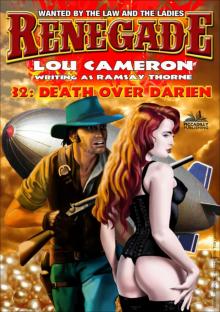 Renegade 32
Renegade 32 Renegade 31
Renegade 31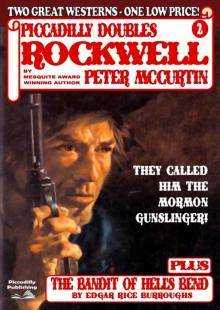 Piccadilly Doubles 2
Piccadilly Doubles 2 Renegade 35
Renegade 35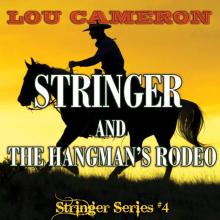 Stringer and the Hangman's Rodeo
Stringer and the Hangman's Rodeo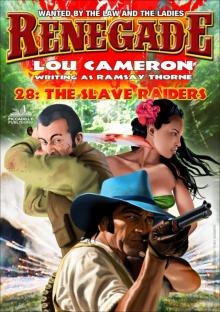 Renegade 28
Renegade 28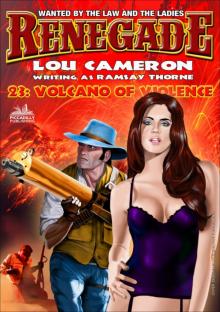 Renegade 23
Renegade 23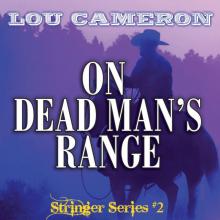 On Dead Man's Range
On Dead Man's Range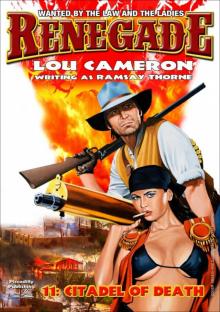 Citadel of Death (A Captain Gringo Western Book 11)
Citadel of Death (A Captain Gringo Western Book 11)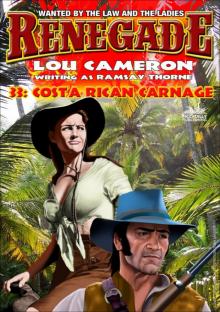 Renegade 33
Renegade 33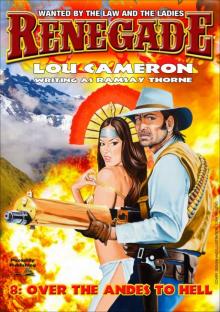 Over the Andes to Hell (A Captain Gringo Western Book 8)
Over the Andes to Hell (A Captain Gringo Western Book 8)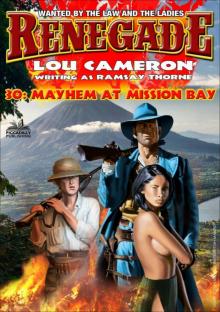 Renegade 30
Renegade 30 Renegade 36
Renegade 36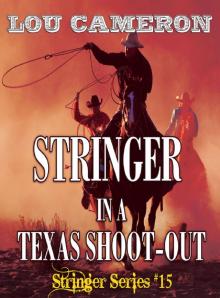 Stringer in a Texas Shoot-Out
Stringer in a Texas Shoot-Out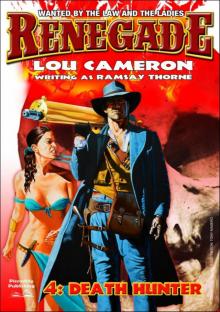 The Death Hunter
The Death Hunter Stringer and the Wild Bunch
Stringer and the Wild Bunch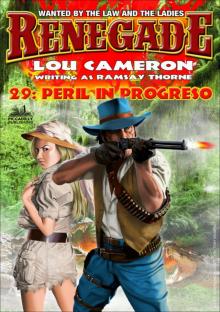 Renegade 29
Renegade 29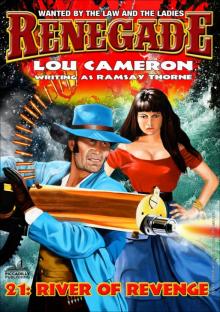 Renegade 21
Renegade 21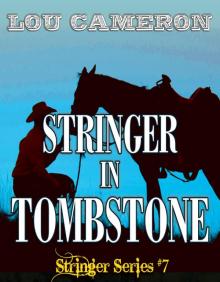 Stringer in Tombstone
Stringer in Tombstone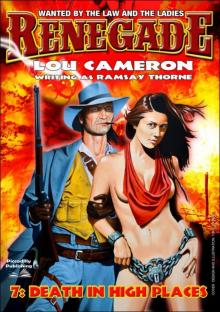 Death in High Places (A Renegade Western Book 7)
Death in High Places (A Renegade Western Book 7)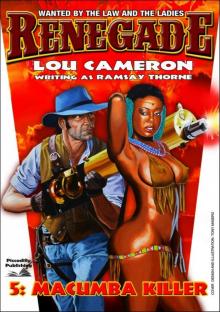 Macumba Killer
Macumba Killer Renegade 17
Renegade 17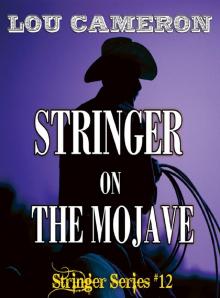 Stringer on the Mojave
Stringer on the Mojave Blood Runner
Blood Runner Renegade 22
Renegade 22 Stringer and the Hanging Judge
Stringer and the Hanging Judge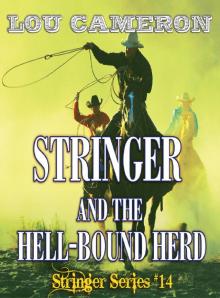 Stringer and the Hell-Bound Herd
Stringer and the Hell-Bound Herd File on a Missing Redhead
File on a Missing Redhead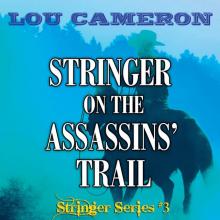 Stringer on the Assassins' Trail
Stringer on the Assassins' Trail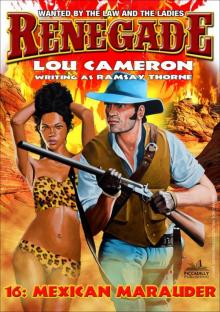 Mexican Marauder (A Captain Gringo Adventure #16)
Mexican Marauder (A Captain Gringo Adventure #16)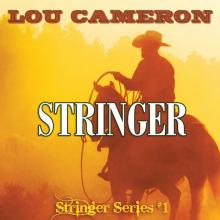 Stringer
Stringer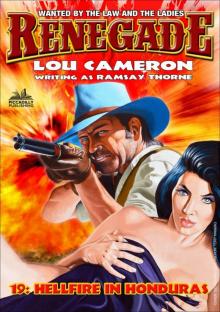 Renegade 19
Renegade 19 Stringer and the Oil Well Indians
Stringer and the Oil Well Indians Stringer and the Lost Tribe
Stringer and the Lost Tribe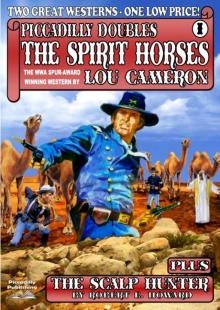 Piccadilly Doubles 1
Piccadilly Doubles 1 Stringer and the Border War
Stringer and the Border War Renegade
Renegade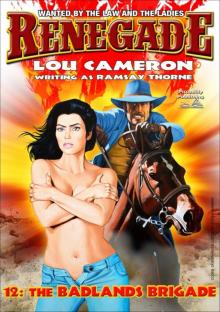 The Badlands Brigade (A Captain Gringo Adventure Book 12)
The Badlands Brigade (A Captain Gringo Adventure Book 12) Stringer and the Deadly Flood
Stringer and the Deadly Flood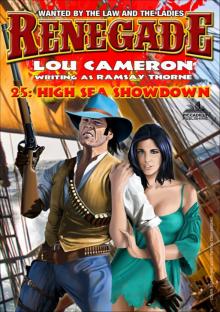 Renegade 25
Renegade 25 The Great Game (A Captain Gringo Western Book 10)
The Great Game (A Captain Gringo Western Book 10)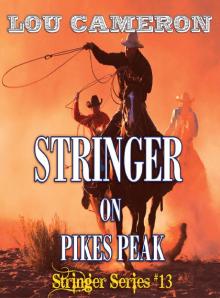 Stringer on Pikes Peak
Stringer on Pikes Peak